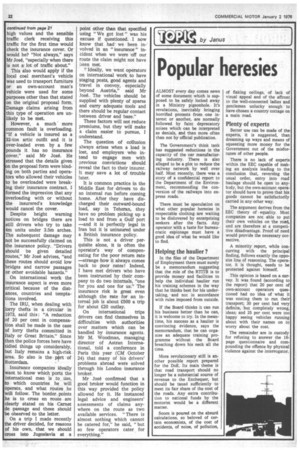Popular heresies
Page 24

If you've noticed an error in this article please click here to report it so we can fix it.
ALMOST every day comes news of some document which is supposed to be safely locked away in a Ministry pigeonhole. It's revelations, inevitably bringing horrified protests from one interest or another, are normally followed by faint deprecatory noises which can be interpreted as denials, and then more often than not by official publication.
The 'Government's think tank has suggested reductions in the capacity of the car manufacturing industry. There is also alleged to be a plot to reduce the railway network by well over half. Most recently, there was a story of a confidential report to the Department of the Environment, recommending the conversion of the railways into express roads.
There must be speculation on what other popular heresies in respectable clothing are waiting to be diseovered by enterprising seekers after the facts. Any operator with a taste for bureaucratic espionage must have a good idea of what he would like to find.
Helping the haulier ?
In the files of the Department of Employment there must surely be a memorandum suggesting that the role of the RTITB is to provide money and facilities to help the individual haulier run his training schemes in the way that he thinks best for his undertaking, and not in accordance with rules imposed from outside.
If the Board thinks it can run his business better than he can, it is welcome to try. In the meantime, his success as a haulier is convincing evidence, says the memorandum, that he can organise an adequate training programme without the Board breathing down his neck all the time.
More revolutionary still is another possible report prepared for the DoE. Its main theme is that road transport should no longer be a substantial source of revenue to the Exchequer, but should be taxed sufficiently to meet its fair share of the cost of the roads. Any extra contribution to national funds by the motorist would be a different matter.
Scorn is poured on the absurd calculations, so beloved of certain economists, of the cost of accidents, of noise, of pollution, of flaking ceilings, of lack of visual appeal and of the affront to the well-connected ladies and gentlemen unlucky enough to have chosen a country cottage on a main road.
Plenty of experts
Better use can be made of the experts, it is suggested, than dreaming up ways and means of squeezing more money for the Government out of the misfortunes of other people.
There is no lack of experts within the EEC capable of making an analysis leading to the conclusion that, reversing the usual order, entry into road haulage should be open to anybody, but the own-account operator should have to prove that his goods cannot be satisfactorily carried in any other way.
The argument derives from the EEC theory of • equality. Most companies are not able to put their own vehicles on the road, and are therefore at a competitive disadvantage. Proof of need would provide the necessary corrective.
A minority report, while concurring with the principal finding, follows exactly the opposite line of reasoning. The operator, it is thought, needs to be protected against himself.
This opinion is based on a survey. It was found (according to the report) that 20 per cent of own-account operators questioned had no idea of what it was costing them to run their transport; 30 per cent had very definite, but completely wrong, ideas; and 25 per cent were too happy seeing vehicles running about with their names on to worry about the cost.
The remainder are in custody for refusing to answer the 16page questionnaire and compounding the offence by physical violence against the interrogator.




































































